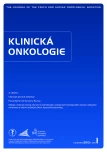Hepatotoxicity Induced by Cyproteron Acetate in the Prostate Carcinoma Treatment – a Case Report
Authors:
M. Vodička 1; T. Šálek 2; E. Röderová 3; D. Černý 4
Authors‘ workplace:
Lékárna, Krajská nemocnice T. Bati, a. s., Zlín
1; Oddělení klinické biochemie, Krajská nemocnice T. Bati, a. s., Zlín
2; Interní klinika IPVZ, Krajská nemocnice T. Bati, a. s., Zlín
3; Oddělení klinické farmacie, Nemocnice Na Homolce, Praha
4
Published in:
Klin Onkol 2013; 26(1): 47-48
Category:
Case Reports
Overview
Background:
Cyproterone acetate is associated with hepatotoxicity during prostate cancer treatment. The information about its toxic mechanism and risk factors is limited, based on pharmacovigilance reports and published case reports only.
Case:
We describe a case of a patient treated with cyproterone acetate (200 mg/day for 9 months) for adenocarcinoma of the prostate. The 75-year-old patient was admitted for the development of jaundice and loss of appetite to the T. Bata Regional Hospital in Zlin, Czech Republic. Laboratory values ALT 994 U/l, AST 1,046 U/l, ALP 193 U/l, GGT 1,128 U/l, bilirubin 177 µmol/l, conjugated bilirubin 138 µmol/l, albumin 26 g/l, Quick time INR 1.23. The concomitant medication included atorvastatin 10 mg daily. Clinical and laboratory outcomes showed acute fulminant liver failure caused predominantly by hepatocellular damage. Hepatotoxicity induced by cyproteron acetate was diagnosed after exclusion of other causes, with a gradual improvement after discontinuation of the respective drug treatment.
Conclusion:
All patients treated with cyproteron acetate for prostate cancer are in risk for the development of liver failure and therefore should be monitored and well educated. More information is needed to sufficiently identify risk factors and explain mechanism of damage.
Key words:
case reports – drug-induced liver injury – drug toxicity – androgen antagonists – cyproterone acetate
Sources
1. Savidou I, Deutsch M, Soultati AS et al. Hepatotoxicity induced by cyproterone acetate: a report of three cases. World J Gastroenterol 2006; 12(46): 7551–7555.
2. Manso G, Thole Z, Salgueiro E et al. Spontaneous reporting of hepatotoxicity associated with antiandrogens: data from the Spanish pharmacovigilance system. Pharmacoepidemiol Drug Saf 2006; 15(4): 253–259.
3. Thole Z, Manso G, Salgueiro E et al. Hepatotoxicity induced by antiandrogens: a review of the literature. Urol Int 2004; 73(4): 289–295.
4. Zimmerman H. Hepatotoxicity: the adverse effects of drugs and other chemicals on the liver. Lippincott Williams & Wilkins 1999.
5. Padda MS, Sanchez M, Akhtar AJ et al. Drug-induced cholestasis. Hepatology 2011; 53(4): 1377–1387.
Labels
Paediatric clinical oncology Surgery Clinical oncologyArticle was published in
Clinical Oncology

2013 Issue 1
- Possibilities of Using Metamizole in the Treatment of Acute Primary Headaches
- Metamizole at a Glance and in Practice – Effective Non-Opioid Analgesic for All Ages
- Metamizole vs. Tramadol in Postoperative Analgesia
- Spasmolytic Effect of Metamizole
- Metamizole in perioperative treatment in children under 14 years – results of a questionnaire survey from practice
-
All articles in this issue
- Proteasome Inhibitors in Treatment of Multiple Myeloma
- Molecular Biological Diagnostics of KRAS and BRAF Mutations in Patients with Colorectal Cancer – Laboratory Experience
- Surgery of the Pulmonary Metastases
- Malignant Melanoma Treated with Radical Chemotherapy, Resemblance Histology of Melanoma to Soft Tissue Sarcomas, Case Report
- Hepatotoxicity Induced by Cyproteron Acetate in the Prostate Carcinoma Treatment – a Case Report
- Pineal Germ Cell Tumors: Review
- Primary Gallbladder Cancer Discovered Postoperatively after Elective and Emergency Cholecystectomy
- Extensive AL Amyloidosis Presenting with Recurrent Liver Hemorrhage and Hemoperitoneum: Case Report and Literature Review
- Clinical Oncology
- Journal archive
- Current issue
- About the journal
Most read in this issue
- Pineal Germ Cell Tumors: Review
- Proteasome Inhibitors in Treatment of Multiple Myeloma
- Malignant Melanoma Treated with Radical Chemotherapy, Resemblance Histology of Melanoma to Soft Tissue Sarcomas, Case Report
- Surgery of the Pulmonary Metastases
